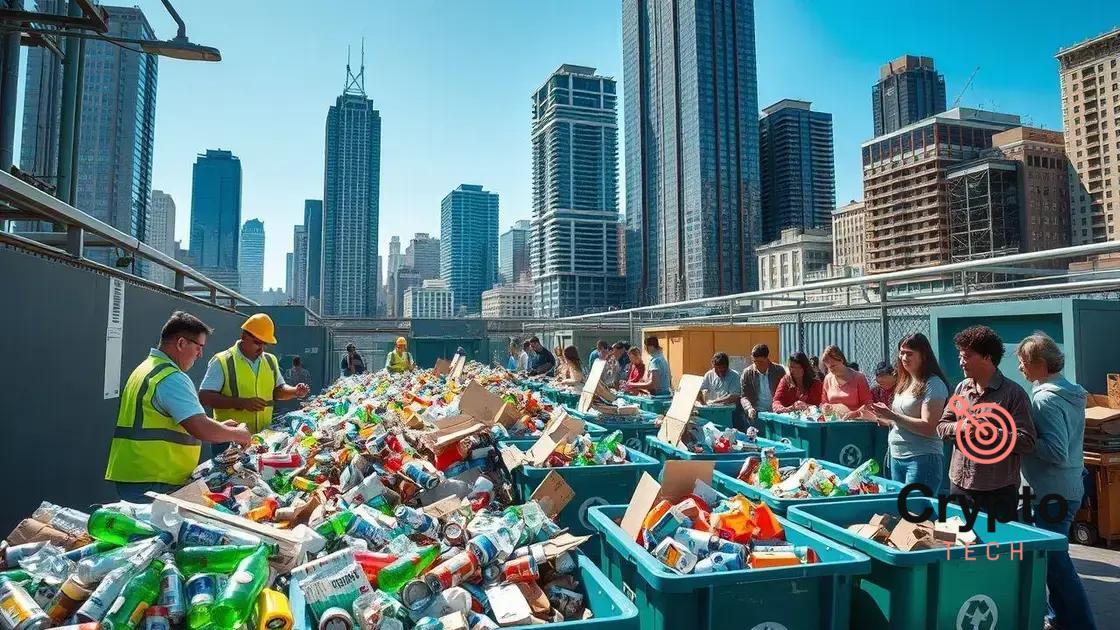How the US is tackling the plastic waste crisis effectively

The US is tackling the plastic waste crisis through innovative recycling programs, community initiatives, and stricter government policies aimed at reducing plastic use and promoting sustainability.
How the US is tackling the plastic waste crisis involves a range of strategies from recycling to community engagement. You might wonder how these efforts impact our daily lives and what role we can play in this movement.
Understanding the plastic waste crisis in the US
Understanding the plastic waste crisis in the US is essential for anyone concerned about the environment. Each year, millions of tons of plastic waste end up in landfills and oceans, posing a serious threat to wildlife and ecosystems.
Plastic takes hundreds of years to decompose, leading to accumulation and pollution. In this article, we will explore the factors contributing to this crisis and what can be done to address it.
Key Factors of the Plastic Waste Crisis
One major factor contributing to the plastic waste crisis is our reliance on single-use plastics. From shopping bags to water bottles, these items are convenient but harmful in the long run. Additionally, many consumers do not know how to properly recycle plastics, which adds to the problem.
- Single-use plastics are pervasive in modern life.
- Improper recycling practices worsen the crisis.
- A lack of awareness about plastic pollution impacts behavior.
- Many plastic items are not recyclable, leading to waste.
Another critical component is the production process of plastics. Manufacturing plastic not only creates waste but also releases harmful pollutants into the environment. As the demand for plastic products continues to rise, so do the environmental impacts.
By understanding the scale of the plastic waste crisis, individuals and communities can take meaningful action. Developing awareness about sustainable practices is a step in the right direction. Simple actions like reducing plastic usage and participating in local clean-up efforts can significantly impact.
Innovative recycling programs in major cities

Across the United States, cities are implementing innovative recycling programs to tackle the growing plastic waste problem. These programs aim to improve recycling rates and reduce landfill dependency.
For instance, cities like San Francisco and New York are leading the way with unique approaches. San Francisco has adopted a goal to achieve zero waste by promoting extensive composting and recycling, ensuring nearly everything is repurposed.
Key Features of Successful Recycling Programs
Effective recycling programs often include community education, smart sorting technology, and incentives for participation. By engaging the public, these programs build awareness and responsibility.
- Community workshops teach residents about proper recycling methods.
- Advanced technology identifies and sorts recyclable materials quickly.
- Incentives encourage households to recycle more, reducing waste.
- Partnerships with local businesses promote recycling initiatives.
Meanwhile, New York City has introduced accessible drop-off centers for plastics that cannot be placed in regular bins. This approach makes it easier for residents to recycle less common items, ensuring more materials are kept out of landfills.
Another key component is tracking and data analysis. Cities monitor the effectiveness of their programs, adjusting strategies based on what works best. This data-driven approach allows for continuous improvement and adaptation to community needs.
In addition, programs that engage schools often lead to lasting change. Educating the younger generation about the importance of recycling fosters habits that will last a lifetime. Schools can implement programs where students participate in recycling projects, emphasizing the importance of sustainability.
Government policies addressing plastic waste
Government policies addressing plastic waste are essential in creating a sustainable future. Various initiatives at federal, state, and local levels aim to reduce the amount of plastic that ends up in landfills and oceans.
For example, some states have initiated bans or restrictions on single-use plastic bags. These bans encourage consumers to shift toward reusable alternatives, reducing plastic consumption significantly.
Key Government Actions
In addition to bans, governments promote recycling through legislation that supports modern facilities and technologies. Investing in better recycling systems allows cities to process more materials efficiently.
- Funding for advanced recycling technologies improves processing rates.
- Mandatory recycling programs foster community participation.
- Regulations on plastic production encourage manufacturers to consider sustainable alternatives.
- Incentives for businesses adopting eco-friendly practices promote broader engagement.
Furthermore, public awareness campaigns play a crucial role. These educate citizens about the impact of plastic waste, emphasizing the importance of recycling and reducing plastic use.
Many governments also engage in international agreements aimed at reducing plastic pollution globally. Collaborating with other nations provides a unified front against the plastic crisis and encourages sharing successful strategies.
Through these policies, governments are taking proactive steps to mitigate the plastic waste crisis. By enforcing regulations and promoting education, they aim to create lasting change that benefits the environment.
Community initiatives for reducing plastic use

Community initiatives for reducing plastic use are vital in the fight against plastic waste. Local efforts can lead to significant changes when people come together to support sustainable practices.
Many neighborhoods have started programs aimed at minimizing single-use plastics. For instance, local groups often organize clean-up days to pick up litter and educate residents about the importance of reducing plastic consumption. These events not only clean the environment but also raise awareness.
Successful Community Programs
Communities can adopt a variety of approaches to encourage plastic reduction. Some towns establish plastic-free zones in shops and markets, promoting eco-friendly alternatives. Others create educational campaigns that highlight the effects of plastic waste on wildlife and health.
- Workshops teach residents to create reusable items like bags and containers.
- Support for local businesses that offer alternatives to plastic.
- Community challenges encourage families to reduce their plastic footprint.
- Partnerships with schools promote recycling and responsible consumption.
In some areas, community gardens improve sustainability by providing local food sources. These gardens often discourage the use of plastic for packaging, as fresh produce is sold directly to consumers.
Many initiatives also focus on policy change. Engaging with local governments to implement regulations that limit plastic usage can lead to broader systemic changes. Residents can unite to advocate for ordinances that encourage sustainable practices.
Overall, community-led initiatives are having a profound impact on reducing plastic waste. By working together, residents can create a culture of sustainability that inspires change at all levels.
Future trends in plastic waste management
Future trends in plastic waste management are evolving as new technologies and strategies emerge. As awareness of the plastic crisis grows, innovative solutions are being developed to reduce waste and promote sustainability.
One significant trend is the increased use of biodegradable plastics. These materials break down faster than traditional plastics, reducing long-term pollution. Many companies are investing in research to create alternatives that are both effective and environmentally friendly.
Technological Advancements
Technology plays a crucial role in managing plastic waste. New recycling technologies, such as chemical recycling, are emerging and allow for more efficient processing of plastic materials. This method breaks down plastics into their original components, enabling them to be reused in high-quality products.
- Advanced sorting systems use AI to improve recycling efficiency.
- Mobile apps help consumers locate recycling centers effectively.
- Social media campaigns educate the public on proper recycling practices.
- Companies are developing closed-loop systems to recycle their own products.
An essential aspect of future trends is engaging communities in sustainability efforts. Public education campaigns are becoming common, encouraging individuals to participate actively in reducing plastic waste. Schools and community organizations are hosting workshops that teach practical skills, such as creating reusable items from waste materials.
Looking ahead, legislation is likely to become stricter regarding plastic production and usage. Countries around the world are starting to adopt policies that limit single-use plastics and require better recycling practices. These regulations could significantly impact how plastics are manufactured and disposed of in the future.
Overall, the future of plastic waste management will depend on a combination of advanced technology, community engagement, and effective policies. As these elements work together, we can hope to see a significant reduction in plastic waste and a healthier planet.
FAQ – Frequently Asked Questions about Plastic Waste Management
What are innovative recycling programs?
Innovative recycling programs use advanced technologies and community involvement to improve recycling rates and reduce plastic waste.
How can communities help reduce plastic use?
Communities can organize educational events, clean-up days, and promote local efforts to reduce single-use plastics.
What role does government play in managing plastic waste?
Government policies can enforce regulations on plastic use, support recycling initiatives, and promote public awareness campaigns.
What are some future trends in plastic waste management?
Future trends include the use of biodegradable plastics, technological advancements in recycling, and stricter legislation regulating plastic production.





